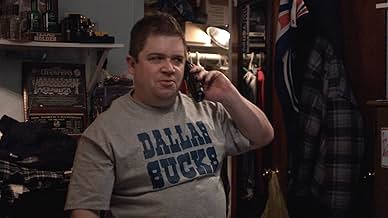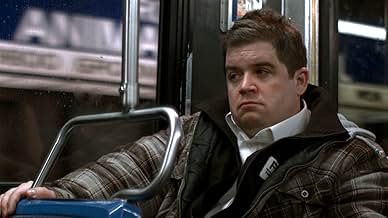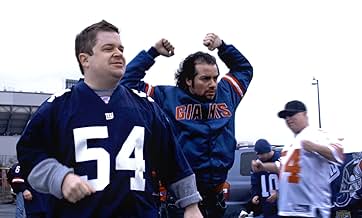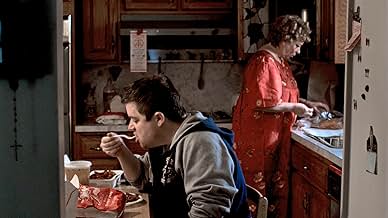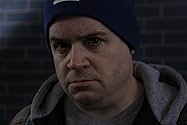CALIFICACIÓN DE IMDb
6.6/10
10 k
TU CALIFICACIÓN
Agrega una trama en tu idiomaA hard-core New York Giants fan struggles to deal with the consequences when he is beaten up by his favorite player.A hard-core New York Giants fan struggles to deal with the consequences when he is beaten up by his favorite player.A hard-core New York Giants fan struggles to deal with the consequences when he is beaten up by his favorite player.
- Premios
- 1 premio ganado y 5 nominaciones en total
Sidné Anderson
- Hospital Doctor
- (as Sidne Anderson)
- Dirección
- Guionista
- Todo el elenco y el equipo
- Producción, taquilla y más en IMDbPro
Opiniones destacadas
What a poetically sad movie! Patton Oswalt is just amazing and sincere as a sad-sack loser who happens to be a HUGE FAN of the New York Football Giants. So much so that he and his pal Sal watch the games on an old TV in the stadium parking lot - presumably for the ambiance - rather than at home.
When the guys run into the team's star linebacker, they follow him surreptitiously - which leads to a cringe-worthy confrontation and, ultimately, Patton's Paul being beaten very badly. Now he's in an unenviable position: he can press charges, partly for the money and partly to teach these "thug athletes" (term from movie) a lesson, or he can let things go so that the Giants don't suffer as a team. This is a die-hard fan right here.
His family thinks it's not a tough decision. His local-celebrity brother, a personal-injury lawyer, certainly wants Paul to sue. His mom wants him out of the house (yes, he lives with his mom). But Paul feels a strange, strong loyalty to the player and the team, despite his severe injuries.
Oswalt is really amazing here. He's not funny. He's never funny. He's just the epitome of pathetic, and Oswalt's portrayal is as authentic as they come. There's so much to him as a character that the ending is an interesting surprise, too.
There's no on-field football action, so if you're looking for sportsing, you're out of luck. This is a character study, and is an exquisitely detailed one. A fine, if somber, movie.
When the guys run into the team's star linebacker, they follow him surreptitiously - which leads to a cringe-worthy confrontation and, ultimately, Patton's Paul being beaten very badly. Now he's in an unenviable position: he can press charges, partly for the money and partly to teach these "thug athletes" (term from movie) a lesson, or he can let things go so that the Giants don't suffer as a team. This is a die-hard fan right here.
His family thinks it's not a tough decision. His local-celebrity brother, a personal-injury lawyer, certainly wants Paul to sue. His mom wants him out of the house (yes, he lives with his mom). But Paul feels a strange, strong loyalty to the player and the team, despite his severe injuries.
Oswalt is really amazing here. He's not funny. He's never funny. He's just the epitome of pathetic, and Oswalt's portrayal is as authentic as they come. There's so much to him as a character that the ending is an interesting surprise, too.
There's no on-field football action, so if you're looking for sportsing, you're out of luck. This is a character study, and is an exquisitely detailed one. A fine, if somber, movie.
Big Fan stands as a profound and thoroughly remarkable character study marked by a magnetic performance of Patton Oswalt. He excels as Paul Aufiero, a life-long fan of New York Giants being brutally hit by one of Giants' top players in a strip club. Oswalt is equally sympathetic and believable starring as this deeply troubled character. His performance is the chief, but thankfully not the only reason to see Big Fan. Writer-director Robert Siegel regards the sports fanaticism as an addiction and that gives his film the necessary gravitas: its power and its credibility. The script is devoid of clichés with many well-observed situations thrown in and several ingenious twists you won't see coming. As a result, you observe Paul falling into decay with great anxiety combined with care. Siegel crafts a subversive comedy, funny and bleak in equal measures. It also works as a peculiar take on the pathology of sports mania.
In his directorial debut, Robert Siegel shows that his true talent still lies in his writing. The tone of Big Fan feels very similar to Siegel's past writing venture, The Wrestler. In both films Siegel proves that he is able to craft a story that feels so rooted in the real world that at times it can feel as if you are simply a fly on the wall watching these events unfold. The only problem with this is that the real world can be boring, and without the direction of Darren Aronofsky to help bolster it, Big Fan occasionally slips into this category.
Big Fan follows the life of Paul Aufiero (Patton Oswalt), a devout New York Giants fan, and parking garage attendant. Paul plods along through his life, living with his mother (Marcia Jean Kurtz) in Staten Island, working nights at the parking garage, and finishing everyday by cranking one out before he falls asleep. We soon see that the only thing that Paul really cares about is football, or more specifically, the New York Giants. Paul meticulously crafts rants about why his Giants are "destined" for glory and calls in to a local late-night sports radio show where he is a known contributor and enemy of Philadelphia Eagles fan, Philadelphia Phil. Paul seems happy with this life and only asks that come Sunday he can put down another win for the Giants. Things then take a turn for Paul as a night out with his best friend Sal (Kevin Corrigan) results in a sighting of his favorite player Quantrell Bishop (Jonathan Hamm). The two follow Bishop through Staten Island eventually coming to a Manhattan strip club. In the club Paul finally builds up the guts to go over and talk to Bishop and in a drunken state Bishop misinterprets something Paul says and beats him to a pulp. The rest of the film follows Paul and his struggle to figure out his life as everyone around him tries to get him to sue, and imprison his hero, all while his Giants stumble and fall from their path to "destiny".
The acting in this film is its true saving grace. Oswalt proves that he is so much more than the voice of the rat in Ratatouille. He becomes Paul, leaving the audience completely convinced that the Giants truly are this man's reason for living. Also of note is Kevin Corrigan. Corrigan is continuing to be "that guy" in movies. He is probably best known as Eddie on TV series Grounded for Life, but he has also popped up in movies like True Romance, Goodfellas, The Departed, and more recently Superbad and Pineapple Express. The guy is a great actor and really deserves a lot more credit than he gets. With the character of Sal, he really is the only character to stick by Paul throughout the entire film, and he is completely believable the entire time. Not once is the audience left to wonder why Sal is supporting every decision Paul makes. Corrigan never makes us feel that he is just the token best friend in the movie. Sal supports Paul because that is who he is and we never doubt that. Corrigan truly deserves to get a lead role in a film so that he can really show people what he can do.
The comparisons between Big Fan and The Wrestler are unavoidable. Both were made on a small budget, take place in lower middle class urban neighborhoods, and deal with sports. Unfortunately for Siegel, where Aronofsky succeeded with The Wrestler, Big Fan seems to falter. The direction is not bad; it just causes the film to sag in spots. I was bored during some long stretches of the movie that made me feel like I was watching the most mundane moments of Paul's day. The visuals often leave something to be desired, making the viewer feel like the film was a few steps away from being great.
Big Fan manages to combine just the right amount of comedy in what is most definitely a drama. The acting is surprisingly good, with both Oswalt and Corrigan turning in great performances. Siegel shows us again that he is a great writer and has a gift when it comes to crafting believable real life dialogue. The direction causes the movie to be boring in some parts most likely due to this being Siegel's first outing. Even if you are not a football fan, which I am not, you will be able to enjoy this movie. And maybe next time you hear a crazed fan on a radio call-in show, you will feel a little differently.
Big Fan follows the life of Paul Aufiero (Patton Oswalt), a devout New York Giants fan, and parking garage attendant. Paul plods along through his life, living with his mother (Marcia Jean Kurtz) in Staten Island, working nights at the parking garage, and finishing everyday by cranking one out before he falls asleep. We soon see that the only thing that Paul really cares about is football, or more specifically, the New York Giants. Paul meticulously crafts rants about why his Giants are "destined" for glory and calls in to a local late-night sports radio show where he is a known contributor and enemy of Philadelphia Eagles fan, Philadelphia Phil. Paul seems happy with this life and only asks that come Sunday he can put down another win for the Giants. Things then take a turn for Paul as a night out with his best friend Sal (Kevin Corrigan) results in a sighting of his favorite player Quantrell Bishop (Jonathan Hamm). The two follow Bishop through Staten Island eventually coming to a Manhattan strip club. In the club Paul finally builds up the guts to go over and talk to Bishop and in a drunken state Bishop misinterprets something Paul says and beats him to a pulp. The rest of the film follows Paul and his struggle to figure out his life as everyone around him tries to get him to sue, and imprison his hero, all while his Giants stumble and fall from their path to "destiny".
The acting in this film is its true saving grace. Oswalt proves that he is so much more than the voice of the rat in Ratatouille. He becomes Paul, leaving the audience completely convinced that the Giants truly are this man's reason for living. Also of note is Kevin Corrigan. Corrigan is continuing to be "that guy" in movies. He is probably best known as Eddie on TV series Grounded for Life, but he has also popped up in movies like True Romance, Goodfellas, The Departed, and more recently Superbad and Pineapple Express. The guy is a great actor and really deserves a lot more credit than he gets. With the character of Sal, he really is the only character to stick by Paul throughout the entire film, and he is completely believable the entire time. Not once is the audience left to wonder why Sal is supporting every decision Paul makes. Corrigan never makes us feel that he is just the token best friend in the movie. Sal supports Paul because that is who he is and we never doubt that. Corrigan truly deserves to get a lead role in a film so that he can really show people what he can do.
The comparisons between Big Fan and The Wrestler are unavoidable. Both were made on a small budget, take place in lower middle class urban neighborhoods, and deal with sports. Unfortunately for Siegel, where Aronofsky succeeded with The Wrestler, Big Fan seems to falter. The direction is not bad; it just causes the film to sag in spots. I was bored during some long stretches of the movie that made me feel like I was watching the most mundane moments of Paul's day. The visuals often leave something to be desired, making the viewer feel like the film was a few steps away from being great.
Big Fan manages to combine just the right amount of comedy in what is most definitely a drama. The acting is surprisingly good, with both Oswalt and Corrigan turning in great performances. Siegel shows us again that he is a great writer and has a gift when it comes to crafting believable real life dialogue. The direction causes the movie to be boring in some parts most likely due to this being Siegel's first outing. Even if you are not a football fan, which I am not, you will be able to enjoy this movie. And maybe next time you hear a crazed fan on a radio call-in show, you will feel a little differently.
Paul is in his mid-thirties, single, and still living at home with his mother. He works as a parking lot attendant in New York, and is content to sit in his booth at night writing down passionate, articulate rants, so that when he goes home he can call a local radio sports show and prove his fanaticism for the Giants, his favorite football team.
Paul is played by Patton Oswalt, one of the funniest stand-up comedians alive, and what he does in this film is really quite remarkable. He creates a fully convincing and pathetic loser, and is unafraid to reveal all the character's lowest points. If this were an Adam Sandler comedy we'd probably have scenes showing us how misunderstood and sweet Paul is, so we can understand that he's the one we're meant to root for, but Oswalt's Paul isn't so cleancut. He treats his family like crap and has terrible mood swings; he only seems truly happy when he's in his element: either witnessing a Giants win or ranting to strangers on the radio. The fact that he must write his speeches down beforehand, and preps himself for hours in advance of calling, says everything.
Paul gets in trouble when he spots a Giants quarterback at a gas station in a shady neighborhood and follows him into a NYC nightclub. After an awkward introduction, Paul makes the mistake of mentioning that he's been following the sports star and his entourage for the past few hours, and the drunken athlete reacts by beating him senseless. Three days later Paul is hospitalized and the police want his statement -- but he suddenly "can't remember" anything that happened, desperately hoping the Giants won't be forced to suspend their star athlete. But that's just the beginning of his problems.
Big Fan is the directorial debut of Robert D. Siegel, who wrote last year's sports-themed The Wrestler. Both movies concern the plights of apparent losers, the biggest difference being Mickey Rourke's 'Ram' actually had a life at one point, whereas Paul's existence is experienced vicariously. Everyone around him tries to offer a better life, whether it's jobs or moving into his own place, but he firmly rejects them. In Paul's eyes, this is his life. He is perfectly content to be discontent, and the movie's lack of transformation for its character will undoubtedly alienate some viewers.
And, put bluntly, Big Fan is not as strong or poignant as The Wrestler. Siegel is not as capable a director as Darren Aronofsky, and the story -- despite clocking in at under an hour and a half -- does tend to meander a few times. But it is endearingly bleak, honest and real, and kept afloat by Oswalt's fascinating performance, which is hard to shake off even after the credits are over.
Paul is played by Patton Oswalt, one of the funniest stand-up comedians alive, and what he does in this film is really quite remarkable. He creates a fully convincing and pathetic loser, and is unafraid to reveal all the character's lowest points. If this were an Adam Sandler comedy we'd probably have scenes showing us how misunderstood and sweet Paul is, so we can understand that he's the one we're meant to root for, but Oswalt's Paul isn't so cleancut. He treats his family like crap and has terrible mood swings; he only seems truly happy when he's in his element: either witnessing a Giants win or ranting to strangers on the radio. The fact that he must write his speeches down beforehand, and preps himself for hours in advance of calling, says everything.
Paul gets in trouble when he spots a Giants quarterback at a gas station in a shady neighborhood and follows him into a NYC nightclub. After an awkward introduction, Paul makes the mistake of mentioning that he's been following the sports star and his entourage for the past few hours, and the drunken athlete reacts by beating him senseless. Three days later Paul is hospitalized and the police want his statement -- but he suddenly "can't remember" anything that happened, desperately hoping the Giants won't be forced to suspend their star athlete. But that's just the beginning of his problems.
Big Fan is the directorial debut of Robert D. Siegel, who wrote last year's sports-themed The Wrestler. Both movies concern the plights of apparent losers, the biggest difference being Mickey Rourke's 'Ram' actually had a life at one point, whereas Paul's existence is experienced vicariously. Everyone around him tries to offer a better life, whether it's jobs or moving into his own place, but he firmly rejects them. In Paul's eyes, this is his life. He is perfectly content to be discontent, and the movie's lack of transformation for its character will undoubtedly alienate some viewers.
And, put bluntly, Big Fan is not as strong or poignant as The Wrestler. Siegel is not as capable a director as Darren Aronofsky, and the story -- despite clocking in at under an hour and a half -- does tend to meander a few times. But it is endearingly bleak, honest and real, and kept afloat by Oswalt's fascinating performance, which is hard to shake off even after the credits are over.
Oswalt plays a guy you might call a loser, but his character wouldn't agree. He's not as over-the-top into loserdom as DiNiro in "King of Comedy." He's not delusional, in other words, just passionate. His team means more than anything to him, and if they are doing OK, he is content. In his world, he has status, and he's just not interested in anything outside that world.
I was surprised to see real acting going on, not comedy. (I won't say "just" comedy - that's hard as hell and takes real talent.) Nothing milked for laughs, nothing that broke the boundaries of the world of the story. A reviewer said Oswalt was "fearless", and I agree. William Goldman wrote of stars that you can never make their parts cool enough for them. That's why so many movies are so terrible. Oswalt has never seemed that interested in being cool. Instead, he dives into his character, as sympathetic or unsympathetic as the moment requires. Not a shtick: character.
It is a low budget production, but I felt it was adequate. The production values didn't hurt. And it is funny, just not 3 jokes / page of script.
I was surprised to see real acting going on, not comedy. (I won't say "just" comedy - that's hard as hell and takes real talent.) Nothing milked for laughs, nothing that broke the boundaries of the world of the story. A reviewer said Oswalt was "fearless", and I agree. William Goldman wrote of stars that you can never make their parts cool enough for them. That's why so many movies are so terrible. Oswalt has never seemed that interested in being cool. Instead, he dives into his character, as sympathetic or unsympathetic as the moment requires. Not a shtick: character.
It is a low budget production, but I felt it was adequate. The production values didn't hurt. And it is funny, just not 3 jokes / page of script.
¿Sabías que…?
- TriviaDirector Robert Siegel has said that between takes in the strip club, while other members of cast and crew were enjoying the company of dancers, actor Patton Oswalt was watching episodes of John Adams (2008) on his iPod in a private room.
- ErroresWhen Paul is reading the newspaper about the Giants' actions regarding the suspended player, two short paragraphs are repeated several times to give the appearance of more news copy.
- Citas
Paul Aufiero: He was rusty.
- Bandas sonorasOoh Poo Pah Doo
Written by Jessie Hill
Performed by Mitch Ryder & The Detroit Wheels
Courtesy of Rhino Entertainment Company
By Arrangement with Warner Music Group Film & TV Licensing
Selecciones populares
Inicia sesión para calificar y agrega a la lista de videos para obtener recomendaciones personalizadas
- How long is Big Fan?Con tecnología de Alexa
Detalles
- Fecha de lanzamiento
- País de origen
- Sitio oficial
- Idioma
- También se conoce como
- Paul Aufiero
- Locaciones de filmación
- Productoras
- Ver más créditos de la compañía en IMDbPro
Taquilla
- Total en EE. UU. y Canadá
- USD 234,540
- Fin de semana de estreno en EE. UU. y Canadá
- USD 24,266
- 30 ago 2009
- Total a nivel mundial
- USD 234,540
- Tiempo de ejecución1 hora 28 minutos
- Mezcla de sonido
- Relación de aspecto
- 1.85 : 1
Contribuir a esta página
Sugiere una edición o agrega el contenido que falta



